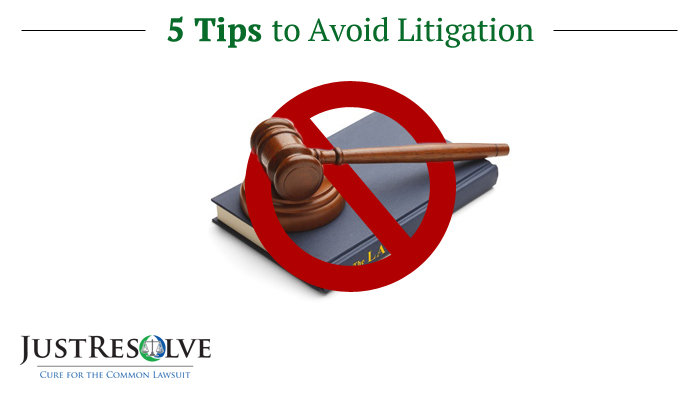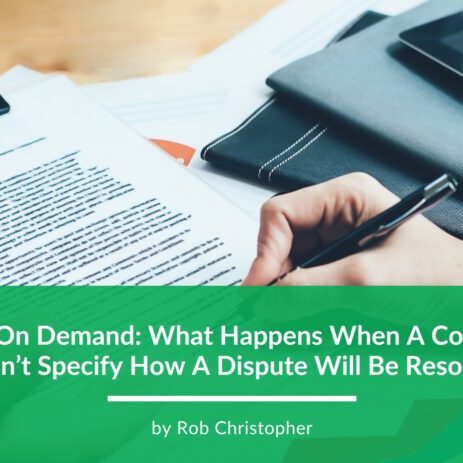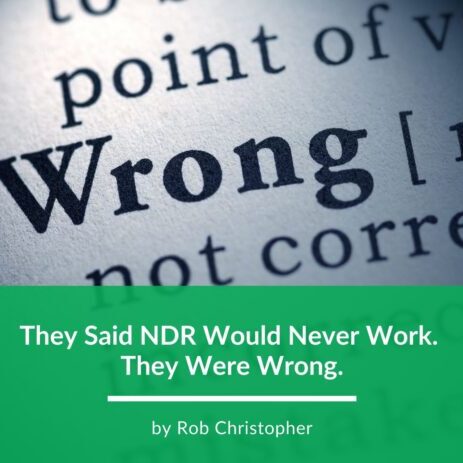5 Tips to Avoid Litigation

Unfortunately, no matter how careful you are in running your business, litigation strikes almost every American business today. Companies seem to be sued over the slightest mishap and even some things that seem crazy, like hot coffee spilled in a customer’s lap as they leave the drive-up window. Fortunately, there are a few things that you can easily do to avoid or significantly reduce litigation involving your business.
1) Plan for disputes
Disputes are inevitable, so plan for them. Don’t wait until disputes occur to take steps to reduce their impact or avoid them entirely. In fact, if the first time you’ve thought about how you will deal with a certain kind of potential dispute is when one arises, it’s usually too late to do those things that could save you the most time, money, and peace of mind. Plans range from consulting with business counsel or outside litigation counsel who are expert in the kinds of disputes that may arise, to thinking through and contractually specifying preferred dispute resolution paths whenever possible, to implementing creative policies that involve engaging senior management to negotiate settlements directly or taking steps to deal differently with those disputes whose stakes will never justify the many costs of litigation. The right plan will vary for each company depending on their business and their most frequent types of disputes.
2) Use Dispute Resolution Clauses in Contracts
Placing an alternative dispute resolution (ADR) clause in your contracts and agreements provides a strong line of defense against having litigation filed against your company in the first place. If you don’t do this, not only will any disputes default to the slow and expensive judicial system, but you may face the prospect and risks of a complicated business dispute being heard by a jury that’s unlikely to be composed of informed peers. ADR clauses can range from requiring both companies’ CEOs to sit down and try to resolve a dispute, to prescribing mediation, to requiring arbitration under a specific set of rules. The variations here are endless. I caution against accepting arbitration clauses without close consideration because arbitration is often just as expensive and time-consuming as litigation, and there’s no right of appeal if the decision is an unwarranted compromise (“splitting the baby”) or otherwise legally incorrect. Mediation (a facilitated negotiation) can save time and money if it works, but if the kinds of disputes you’re likely to get into aren’t especially susceptible to split-the-baby compromises, this may just increase total costs and time. Perhaps a non-adversarial neutral-driven approach makes more sense for smaller disputes, or as an optional (or even mandatory) process for employee grievances. In sum, the best solution requires that you really think through what makes sense for your company.
3) Draft Contracts with Litigation in Mind
Litigators always wish transactional lawyers knew what they go through during litigation. I had a long conversation with a litigator at Genentech recently and he was lamenting that he wished transactional lawyers would define what the heck they were talking about so that in litigation he wouldn’t have to spend all of his time defining what others meant when they were drafting the contract eight years earlier. He said that if transactional lawyers drafted contracts with litigation in mind and defined things clearly, a lot of disputes would be avoided right out of the gate. So … define, define, define the terms used in your agreements. I think this tip can be put another way – involve your stakeholders (finance/tax/accounting, risk management, legal, etc.) when drafting agreements to cut down on the potential for disputes later. Be clear in your drafting so that each stakeholder understands what you are talking about.
4) Require the Loser to Pay All Attorney Fees
In the United States, each party’s litigation costs are paid by the party incurring them unless there is an agreement to the contrary. In other countries, like England for example, the loser pays everyone’s litigation costs. Paying all of the legal costs for litigation is a great incentive not to litigate but to settle the dispute early on and not go through the court system. If you include a clause in your agreements specifying that a prevailing party’s attorney’s fees and costs are to be paid by the losing party, you increase your chances that, if you are right, you may obtain real justice, and discourage questionable claims and defenses in the first place.
5) Take Responsibility for Your Actions
Most litigation can be avoided if a party who has made a mistake apologizes and takes responsibility for its behavior. I was at one company that would not address mistakes with customers and in fact would hide the mistake and try to fix it in the background or under the radar. That practice cost them dearly over time. Contrast that attitude and action with Odwalla when it found itself in the center of death and illness among its customers. Odwalla voluntarily recalled its juices in 1996 at great cost to the company and apologized to its customers for causing death and illness with unpasteurized apple juice that ended up containing the deadly E. coli bacteria. While it cost them sales, profits and reputation in the short run, including the largest fine ever levied to that point in the food industry, they suffered far less vilification and fewer punitive awards, saving their brand and enabling a healthy re-emergence later.
These 5 tips on how to avoid litigation are just the tip of the iceberg of things you can do in your company to avoid litigation and minimize the number and types of disputes.
More to read
NDR on Demand: What Happens When a Contract Doesn’t Specify How a Dispute Will Be Resolved?
The best way to deter threats of litigation and minimize the costs, duration, and distractions of resolving any dispute is to put a dispute resolution clause specifying NDR — Neutral-Driven Resolution — in all your contracts BEFORE there is a problem. That means that if a dispute should arise between a business and a contractor,…
They Said NDR Would Never Work. They Were Wrong.
Many people are surprised by how effective NDR can be. Since publishing my book and speaking at events about NDR (Neutral-Driven Resolution), I’ve often been asked a simple question: Does it work? And if it really does lower the costs and the time it takes to settle common disputes, why doesn’t everybody know about…
“Morgan Hill author releases new book”
The Morgan Hill Times featured Rob’s new book in an article ahead of his “Meet the Author” night at Booksmart. “Legal disputes and conflicts cost businesses billions of dollars a year in lawyers’ fees, lost productivity, time and aggravation. A new book by Morgan Hill author Robert Christopher proposes an innovative, faster and simpler way…
Not All Disputes are Equal
Not all business and legal disputes are alike, and not all of them can be resolved in the same way. In writing my book Just Right: How Neutral-Driven Resolution Can Close the Gap in American Civil Justice, it was important to distinguish the types of common disputes for which NDR is most suitable. As readers…



